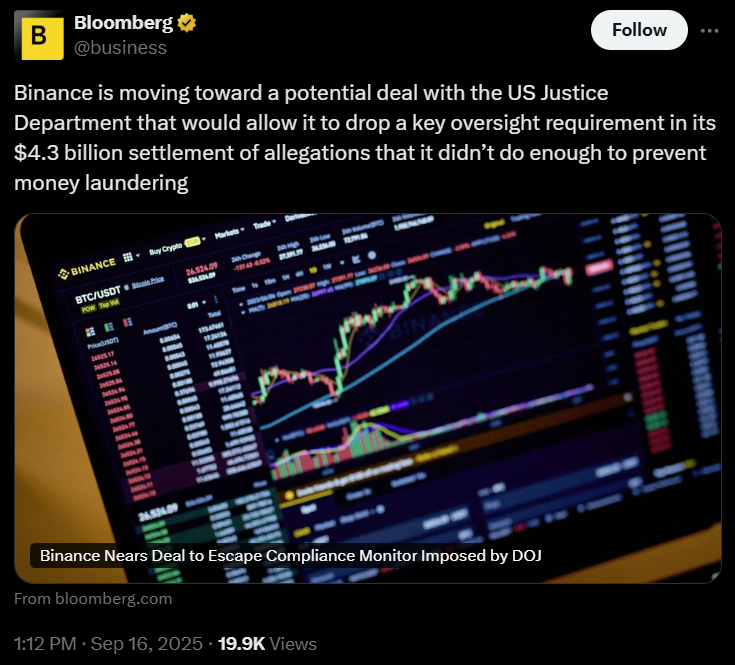Binance is reportedly engaged in discussions with the US Department of Justice (DOJ) to remove a significant oversight measure from its 2023 settlement agreement—a move that could potentially ease regulatory and compliance burdens on the leading cryptocurrency exchange.
Sources familiar with the matter indicate that the DOJ is considering lifting the requirement for Binance to be overseen by an independent compliance monitor. This condition was part of a $4.3 billion agreement reached in 2023, following allegations of multiple compliance lapses, including inadequate anti-money laundering safeguards.
It’s important to note that this settlement pertains to Binance’s global operations, not its US-focused affiliate, Binance.US, which operates as a separate legal entity. The move to potentially remove external oversight reflects an emerging trend within the DOJ, which has shown signs of reducing or ending certain compliance monitoring requirements for select companies, citing concerns over costs and operational disruptions.
Bloomberg reports that at least three other major companies—mining giant Glencore Plc, UK-based NatWest Group Plc, and Australian firm Austal Ltd.—have successfully avoided extended compliance monitoring in recent years. This shift could mark a broader regulatory movement aimed at balancing enforcement with operational practicality in the evolving crypto markets.


The potential easing of oversight occurs amid a period where the US regulatory environment for cryptocurrencies is gradually becoming more defined. This comes as the industry benefits from a more industry-friendly approach under the Biden administration, which has supported several initiatives aimed at clarifying crypto regulation, including efforts to develop clearer guidelines around digital assets and blockchain-based innovations.
Crypto companies seek clearer regulatory frameworks amidst evolving oversight
The move by Binance to negotiate reduced compliance restrictions aligns with a broader industry trend. Recent legislative advances include the signing of the GENIUS stablecoin bill and the passage of bills related to market structure and anti-CBDC measures. Regulatory agencies like the SEC and CFTC are also clarifying their positions on digital assets, moving towards more transparent and predictable frameworks.
SEC Chair Paul Atkins has emphasized an end to “regulation through enforcement,” promising clearer guidance on tokenization and other crypto-related activities. Meanwhile, the CFTC has introduced pathways for foreign crypto exchanges to serve US clients within legal boundaries, signaling a more approach that aims to balance regulation with innovation.
This evolving landscape suggests that the future of crypto regulation in the US may become more predictable and industry-friendly, potentially encouraging broader adoption and innovation in the blockchain and DeFi sectors.
Magazine: GENIUS Act reopens the door for a Meta stablecoin, but will it work?
